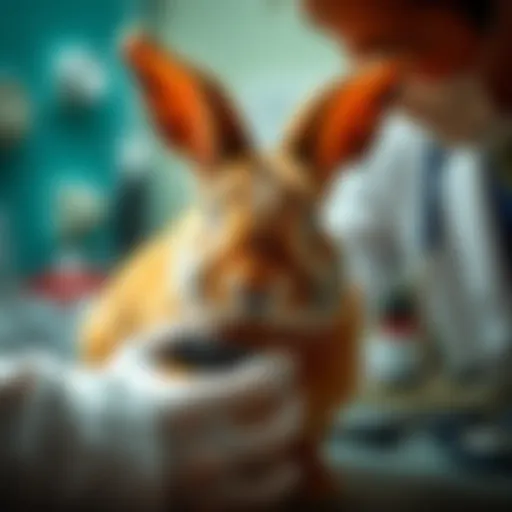Avian Veterinary Care: A Comprehensive Guide for Raleigh
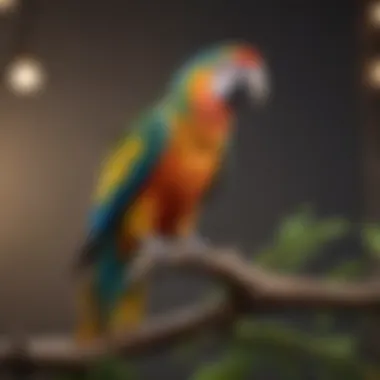

Intro
Avian companions bring joy to many homes. However, their care requires unique understanding and attention. This section aims to explore the essential elements of avian veterinary care specific to Raleigh, ensuring bird owners are well-informed about keeping their feathered friends healthy. From understanding your pet's needs to identifying common health issues, it is vital for pet owners to gain insights into proper avian care.
Understanding Your Pet
Understanding the species you share your life with is crucial to providing the best care. Birds have unique behaviors and needs that often differ from those of traditional pets like dogs or cats.
Pet Behavior Basics
Birds communicate through a variety of vocalizations and body language. They use chirps, whistles, and squawks to express their emotions. Owners should be observant of changes in these behaviors as they can indicate stress or health issues.
Common Breed Characteristics
Different bird breeds display distinct characteristics. For instance, African Grey Parrots are known for their intelligence and social nature, while budgerigars are more playful. Understanding breed traits can help tailor care to individual needs.
Species-Specific Needs
Different species can have vastly different requirements. For example, some birds prefer a diet high in seeds, while others require pellets or fresh fruits and vegetables. Familiarizing yourself with these specifics is key to their health and happiness.
Pet Care and Maintenance
Regular care ensures longevity in pet birds. A comprehensive approach addresses their feeding, grooming, and hygiene needs.
Feeding Guidelines
A balanced diet is essential for birds as it supports their overall health. In Raleigh, many avian vets recommend a combination of pellets, fresh fruits, and veggies. It is crucial to avoid feeding birds avocado, chocolate, and caffeine, as these can be toxic.
Grooming Essentials
Grooming is just as important for birds. Regular nail trims prevent injuries, while consistent beak care is needed to avoid overgrowth. Bathing your bird also helps keep feathers clean and free from pests.
Hygiene Practices
Maintaining cleanliness in the living environment is vital. Regularly clean cages, change food and water, and remove droppings to prevent infections and ensure a hygienic habitat for your pet.
Training and Development
Training enhances the bond between the bird and owner. It also fosters a better understanding of the pet's needs.
Basic Commands and Skills
Teaching basic commands such as "step up" can help with handling your bird effectively. This includes training techniques suited for different species, as some are more receptive to training than others.
Behavioral Training Techniques
Using positive reinforcement encourages desired behaviors. This method promotes trust and helps in managing unwanted behaviors.
Addressing Common Behavior Issues
Addressing issues like excessive screeching or biting requires patience. Identifying the root of the problem is key, whether it be boredom, lack of socialization, or health concerns.
Health and Wellness
Monitoring health ensures your bird remains in optimal condition. Regular vet check-ups can prevent serious health issues.
Routine Vet Check-ups
Schedule annual visits with an avian vet in Raleigh. They can monitor your bird's health and catch potential problems early on.
Vaccination Needs
Vaccinations may vary based on species and local regulations. Discussing specific needs with your vet ensures adequate protection from illnesses.
Recognizing Signs of Illness
Being aware of subtle signs of illness is crucial. Changes in appetite, lethargy, or feather plucking can indicate the need for veterinary care. Quick action can often make a significant difference.
Enrichment and Activities
Engaging your bird in various activities is essential for mental well-being.
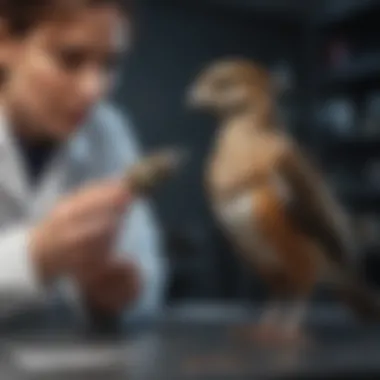

Indoor vs. Outdoor Activities
While outdoor time is beneficial, ensuring safety is imperative. Supervised outdoor time is ideal, particularly in a secure area where they are protected from predators.
Interactive Toys and Games
Providing a range of toys helps prevent boredom. Twisting, chewing, and puzzles stimulate mental activity, which is essential for happiness.
Socialization Opportunities
Birds are social beings. Interacting with other pet birds or family members can contribute to their overall health.
Understanding the needs of your avian companions is not just about routine care; it’s about establishing a relationship built on trust, communication, and mutual respect.
Understanding Avian Veterinary Care
Avian veterinary care is a specialized field tailored to meet the unique health needs of birds. Unlike other pets, birds are biologically distinct, which requires veterinarians to approach their care with a unique perspective. This article delves into the critical aspects of avian veterinary care, addressing what it entails and why it matters to bird owners.
Understanding avian veterinary care is essential for ensuring the health, well-being, and longevity of our feathered companions. Birds often mask their illnesses until they become serious, so knowledgeable care is vital. Regular check-ups with an avian vet can help prevent and identify diseases early, ultimately saving lives. This care encompasses preventive measures, diagnosis, treatment, and management of health issues that can affect birds across various species.
The Role of an Avian Vet
The role of an avian vet extends beyond routine check-ups. These professionals possess specialized training in the anatomy and physiology of birds, making them uniquely qualified to address avian health concerns. They are adept at diagnosing diseases that are specific to birds and are familiar with their unique behavioral traits.
Avian vets conduct thorough examinations, which may include:
- Physical assessments
- Blood work
- Diagnostic imaging
- Exams for specific species
Pet owners should seek out an avian vet when they notice any changes in their bird’s behavior or physical condition. This prompt action can be crucial in preventing further health complications.
Unique Aspects of Avian Medicine
Avian medicine presents unique challenges and benefits compared to traditional animal care. Birds have different metabolic rates and body structures, requiring specific techniques and equipment for examinations and treatments. For example, the respiratory system of birds is highly efficient, but it also makes them vulnerable to environmental toxins.
Some specific aspects of avian medicine include:
- Understanding species-specific needs: Different bird species have unique dietary and environmental needs that a general vet may not address properly.
- Behavioral considerations: Birds display distinct behavioral patterns that can indicate stress or illness. Recognizing these signs is key to effective treatment.
- Preventive health measures: Avian vets prioritize preventive care, such as vaccinations and wellness evaluations, rather than solely addressing existing health issues.
In summary, avian veterinary care is an essential field dedicated to maintaining the health and quality of life of birds. By understanding the role of an avian vet and the unique aspects of avian medicine, pet owners can make informed decisions about their bird's healthcare and foster a healthy, happy life for their feathered friends.
Finding an Avian Vet in Raleigh
Finding a suitable avian vet in Raleigh is crucial for the health of your feathered companion. Unlike common pets, birds have unique medical needs. Their physiology, behavior, and environment must be considered when looking for veterinary care. Selecting the right vet can make a significant difference in the well-being of your bird. A strong vet-client relationship is important for both the bird and the owner. Understanding the specific criteria for selection and knowing local options can help pet owners make an informed decision.
Criteria for Selecting a Vet
When choosing an avian vet, various factors should be evaluated. Here are the key criteria:
- Qualifications and Experience: Check for certifications. An avian vet should have specific training in bird medicine. Experience is also vital; an established vet is likely to be more skilled.
- Facility and Equipment: The clinic should be equipped to handle avian species. This includes appropriate diagnostic tools like specialized imaging equipment.
- Availability: Look for a vet who offers flexible hours and emergency care. Birds can develop sudden health issues that may require urgent attention.
- Client Feedback: Reading reviews from other bird owners can provide insights into the vet's care and approach. Positive testimonials enhance trust.
- Communication: A good veterinarian should communicate clearly and effectively. They should address any concerns you have regarding your bird's health.
List of Avian Vets in Raleigh
Raleigh offers various options for avian veterinary care. Here are some vetted practices you might consider:
- North Hills Animal Hospital: This facility specializes in avian and exotic animal care. They provide routine check-ups, vaccinations, and emergency services.
- Animal Hospital of Cary: Known for its focus on avian health, this hospital features a team trained in handling birds and related health issues.
- Pinecrest Animal Hospital: Offers comprehensive avian services from wellness exams to emergency care. Their specialists are skilled at diagnosing common avian illnesses.
- DVM Veterinary Clinic: This clinic has received high ratings from clients. They provide a wide range of services specifically for birds, including surgical procedures.
Identifying suitable avian vets in Raleigh can greatly contribute to your bird's health. Armed with proper knowledge and local resources, pet owners can ensure their avian companions receive the best possible care.
Common Health Issues in Birds
Avian health issues are often subtle and can escalate rapidly if not addressed in a timely manner. Understanding common health problems in birds is vital for ensuring their welfare. Birds often hide their illnesses instinctively, which can make detecting health issues quite challenging for their owners. Awareness of symptoms and regular check-ups can make a big difference in a bird’s longevity and vitality. Preventative measures are particularly important because some conditions can be avoided with proper care.
Signs of Illness in Avian Species
Birds show different signs when they are ill compared to more traditional pets like dogs or cats. Common indicators of illness may include:
- Change in Appetite: Eating less or not eating at all can signal illness.
- Fluffed Feathers: A bird's feathers will often be puffed up when they are unwell, indicating stress or discomfort.
- Lethargy: If a bird is less active, it might be a warning sign.
- Discharge: Nasal discharge or changes in droppings can indicate underlying health problems.
- Breathing Changes: Listen for unusual sounds while a bird breathes, as this can suggest respiratory infections.
It is crucial for owners to monitor their bird’s behavior closely. Regular interaction and observation make it easier to notice any abnormalities. A sudden change in behavior should prompt a visit to an avian veterinarian.
Preventative Care for Birds
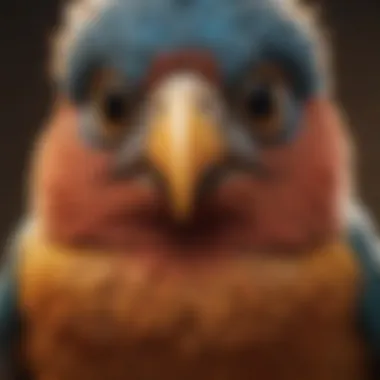

Preventative care is the cornerstone of maintaining avian health. By focusing on the following aspects, owners can ensure their birds remain healthy:
- Regular Veterinary Check-ups: Annual exams can detect problems before they become serious. Avian vets can perform necessary health screenings and provide vaccinations if needed.
- Balanced Diet: Birds require a varied diet that reflects their species’ needs. A combination of high-quality pellets, fresh fruits, and vegetables should be included.
- Environmental Enrichment: Providing birds with toys, perches, and space to fly can help reduce stress and prevent behavioral issues.
- Hygiene: Maintaining a clean habitat is essential. Regularly cleaning cages, perches, and bowls minimizes the risk of infections.
Preventative care not only fosters good health but also aids in the overall quality of life for the bird. Regular attention and proactive care strategies empower pet owners to be their birds’ best advocates.
Diagnostic Tools and Techniques
Proper diagnosis is the first step in ensuring the health of birds. They often mask symptoms, making diagnosis quite complex. Today, avian veterinary care relies on a variety of diagnostic tools and techniques, essential for identifying health issues in birds. These tools not only help in detecting diseases but also in monitoring overall health. The proper use of these diagnostics can lead to timely interventions, potentially saving avian lives.
Common Diagnostic Tests
Avian vets use several diagnostic tests suitable for birds. Each test serves a different purpose and can reveal critical information about a bird's health.
Some common diagnostic tests include:
- Physical Examination: This is typically the first step. A thorough examination assesses the general condition of the bird, checking body weight, feathers, and overall appearance.
- Radiographs (X-rays): X-rays help in visualizing internal structures. They are useful for diagnosing bone fractures, tumors, and respiratory issues.
- Ultrasound: This technique uses sound waves to create images of the internal organs. It can detect fluid in the abdomen or assess organ size.
- Fecal Exams: These help identify parasites or bacteria in the digestive system by analyzing droppings.
- Culture and Sensitivity Tests: These tests identify specific organisms causing infections, helping vets choose the right antibiotics.
Each test provides vital information. Understanding these can be highly beneficial for bird owners seeking insight into their pet’s health.
The Importance of Avian Blood Work
Blood work is a crucial aspect of avian diagnostic techniques. It provides comprehensive insights into the bird's physiological state. Blood tests can reveal infections, organ function, and metabolic issues.
Regular blood work is recommended, especially for aging birds, as it often catches potential diseases before symptoms appear. Key benefits include:
- Early Detection: Identifying issues before they become critical allows for timely treatment.
- Monitoring Chronic Conditions: Birds with ongoing health concerns require regular checkups. Blood work helps track these conditions effectively.
- Assessing Nutritional Health: Blood tests can detect vitamin and mineral deficiencies, guiding diet adjustments.
In summary, understanding these tools equips bird owners with knowledge to make informed decisions about their pets' healthcare. Both common diagnostic tests and blood work play a vital role in avian veterinary practice, underpinning the health and well-being of feathered companions.
Surgical and Emergency Care
Surgical and emergency care represent crucial aspects of avian veterinary practice. Birds, despite their delicate structure and unique physiology, may require surgical intervention or emergency treatment at various points in their lives. It is essential for bird owners to understand these aspects to ensure their feathered companions receive the appropriate care when needed.
In this context, both surgical procedures and emergency care aim to restore health and alleviate suffering. Timely intervention can indeed be life-saving, making it vital for bird owners to recognize when to seek professional help. Furthermore, understanding the potential risks and benefits involved in surgical procedures can also assist owners in making informed decisions regarding their pet’s health.
Common Surgical Procedures
Various common surgical procedures may be necessary for birds. These may include:
- Wing Trimming: This procedure involves cutting the primary flight feathers to prevent birds from flying away and hurting themselves or getting lost. It is sometimes advisable for safety, especially for indoor birds.
- Neutering and Spaying: These surgeries are important for controlling pet populations and can also address certain behavioral issues related to mating instincts.
- Tumor Removal: Birds can develop tumors, and surgical removal might be necessary. Assessing the type and location of the tumor is crucial for deciding on the best approach.
- Gastrostomy: This involves creating an opening directly into the stomach for feeding, particularly in birds that have trouble eating due to various health issues.
Each of these surgical procedures has its specific requirements and aftercare protocols. It is beneficial for pet owners to discuss these with their avian vet to understand the implications.
Managing Emergencies
Managing emergencies in birds requires quick thinking and a clear understanding of what constitutes an emergency. Common emergency situations may include:
- Trauma: Injuries from falls, bites, or accidents should be treated without delay.
- Respiratory Distress: Signs such as labored breathing or open-mouth breathing indicate immediate attention is needed.
- Severe Bleeding: Avian species can lose blood rapidly. If you notice significant bleeding, it is crucial to apply pressure and seek emergency vet care.
- Sudden Changes in Behavior: If a typically active bird becomes lethargic or refuses to eat, it often indicates an underlying health issue that needs addressing.
In emergencies, bird owners should stay calm and quickly gather pertinent information before contacting their avian veterinarian. Knowing the location of the nearest emergency vet clinic can save time. Always transport birds in a secure carrier to minimize stress and prevent additional injuries.
"Prompt action during a medical emergency can make the difference between recovery and loss. Don't hesitate; reach out for professional help when in doubt."
By understanding surgical and emergency care, pet owners can significantly improve their birds' outcomes during crises and health challenges.
Nutrition for Avian Health
Nutrition plays a vital role in the overall wellbeing of birds. Proper feeding affects not just their physical health but also their behavior and longevity. Avian species have specific dietary needs that differ significantly from traditional pets like dogs or cats. It is crucial for bird owners to understand these needs to support the health of their feathered companions.
Key aspects of nutrition for avian health include balancing various food groups and being aware of the type of food that suits different species. A varied diet promotes good digestion and prevents nutritional deficiencies. It is also essential to consider factors like age, size, and any underlying medical conditions. The right combination of foods can enhance not only both physical health and emotional stability in birds.
A balanced diet is the cornerstone of avian health. It minimizes the risk of disease and supports a vibrant lifestyle.
Understanding Avian Diets
Bird diets generally include seeds, fruits, vegetables, nuts, and pellets. Each of these components serves a purpose. For example, seeds provide fats, but an all-seed diet can lead to obesity and other health problems. Fresh vegetables introduce important vitamins and minerals. Additionally, fruits add necessary sugars and hydration to the diet. Pellets are formulated to offer a complete nutrient package tailored for specific bird species.
- Seeds: High in fat, they should not dominate the diet.
- Fruits and Vegetables: Offer essential vitamins. These should be fresh and varied.
- Pellets: Provide a balanced nutrient profile that is often missing from other foods.
Birds can be picky eaters, sometimes preferring seeds over other foods. This can lead to malnutrition. Educating pet owners about diversifying their birds' diets will help prevent poor eating habits. Gradual introduction of new foods may aid in a smoother transition.
Supplementation and Vitamins
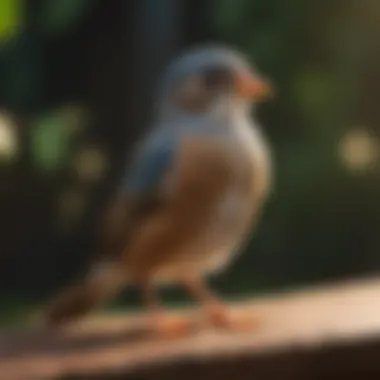

Even with the best avian diets, some birds may require additional supplementation. This is particularly relevant for birds with specific health concerns, or those who may not consume a full range of natural foods. Owners should consult with their avian veterinarian before starting any supplements.
Common supplements include vitamins A, D, E, and C, along with calcium. Vitamin deficiencies can lead to severe health issues, such as respiratory problems or weakened immune systems. A veterinarian may suggest a specific supplementation regime based on the bird's needs.
- Vitamin A: Essential for good vision and a healthy immune system.
- Calcium: Important for bone health, especially in laying hens or breeding birds.
- Multivitamins: Useful for overall health, particularly if the bird shows signs of dietary imbalances.
It is important to monitor birds’ reactions to added vitamins and adjust accordingly. Too much supplementation can be harmful. Therefore, striking the right balance is essential to maintaining the avian health.
In summary, optimizing nutrition and understanding dietary needs is paramount for bird owners in Raleigh. This approach ensures feathered friends live healthy and fulfilling lives.
Behavioral Health in Birds
Behavioral health is a critical aspect of avian care, influencing not only the quality of life for birds but also their overall health. Birds, like humans, exhibit a range of behaviors influenced by their environment, social interactions, and physical health. Understanding behavioral health can help pet owners create a balanced and fulfilling life for their avian companions. Recognizing and addressing behavioral issues early can prevent more serious problems in the future, ultimately leading to a stronger bond between bird and owner.
Recognizing Behavioral Issues
Identifying behavioral issues in birds often requires keen observation. Changes in a bird's behavior can be subtle, yet they may indicate underlying health problems or stress factors. Common signs of behavioral issues include:
- Excessive vocalization
- Feather plucking or self-mutilation
- Aggression toward humans or other pets
- Changes in eating habits or appetite
- Withdrawal from social interactions or activities
- Destructive behaviors, such as chewing on cages or toys
Awareness of these signs is crucial for early intervention. For example, a once-active parrot may become withdrawn due to illness or changes in its environment. Consulting with an avian veterinarian can provide insights into these behavioral changes, ensuring pets receive the proper care.
"Birds are highly social creatures, and their behaviors reflect their emotional and physical well-being."
Strategies for a Healthy Environment
Creating a healthy environment for birds is essential for maintaining their behavioral health. Simple changes can have profound effects on their mood and behavior. Consider the following strategies:
- Provide Enrichment: Birds require mental stimulation. Offer toys, puzzles, and activities that challenge them. Rotating toys can keep their interest alive.
- Social Interaction: Spend time with your bird daily. Many species thrive on interaction, so consider adopting the bird in pairs or spending quality time together.
- Safe Space: Birds should have a space in the home where they feel safe. This area should be free from disturbances and allow them to retreat when overwhelmed.
- Proper Nutrition: Diet has a significant impact on behavior. Ensure your bird's diet is balanced with fresh fruits, vegetables, and high-quality pellets.
- Regular Veterinary Check-ups: Ongoing health assessments help catch any potential issues early. Regular consultations with an avian vet can help monitor behavioral health and overall well-being.
Implementing these strategies can significantly enhance your bird's quality of life, promoting a sense of security and happiness, essential for a healthy companion.
Local Resources for Bird Owners
Local resources play an integral role in the well-being of avian companions. They connect bird owners to a community of knowledgeable individuals and provide access to a wealth of information. In Raleigh, these resources contribute to both educational efforts and social interactions among bird enthusiasts. Access to avian clubs or organizations can facilitate the discovery of best practices in bird care. Engaging with others can be practiced through shared experiences, questions, or concerns. Through these connections, bird owners gain invaluable support.
Avian Clubs and Organizations
Avian clubs and organizations provide a platform for bird owners to connect with each other. Joining clubs allows members to share insights and experiences related to avian care. Organizations such as the Raleigh Avian Society promote education and awareness about bird health, behavior, and husbandry. They often host events, meetings, and social gatherings. This offers opportunities to meet fellow enthusiasts, experts, and veterinarians. The sense of community fosters a supportive environment for new and seasoned bird owners alike.
Additionally, these clubs may conduct special events that include guest speakers, workshops, and training sessions. Many avian clubs also advocate for avian welfare, contributing to local initiatives that align with better bird care standards. By forming relationships with these organizations, owners may find mentors who guide them through the nuances of avian care.
"Engagement in avian clubs transforms knowledge sharing into a communal care effort for birds."
Workshops and Educational Material
Educational resources, particularly workshops, equip bird owners with essential guidelines for responsible avian caretaking. Workshops often cover diverse topics ranging from nutrition and behavior to health care and enrichment activities. Access to credible educational material enriches the owner's understanding of their feathered companions.
Many of these workshops are conducted by veterinarians or avian specialists. They provide hands-on learning experiences and practical knowledge. This not only raises awareness of common health issues but also teaches preventative measures. Online resources are also becoming more prevalent. Websites like en.wikipedia.org and britannica.com offer articles that cover a broad range of avian topics. Forums or discussion groups on platforms such as reddit.com serve as additional outlets for gaining practical advice from other bird owners.
It is essential to evaluate the credibility of sources, however. Choosing workshops led by trusted experts enhances the learning experience. By attending workshops and leveraging quality educational materials, bird owners can establish a solid foundation for caring for their avian friends.
The Future of Avian Veterinary Care
The future of avian veterinary care is crucial for both pets and their owners. Advances in knowledge and technology will shape how we approach bird health, ensuring they receive the best possible care. As we move forward, understanding these changes will be key in maintaining the well-being of avian companions.
New approaches in avian veterinary care focus not only on treatment but also on overall wellness. This proactive mindset can lead to better outcomes for birds. Educating pet owners about these developments is essential. Knowledge empowers owners to navigate health issues effectively.
Emerging Trends in Avian Medicine
There are many emerging trends in avian medicine. One notable trend is the shift towards more holistic care. Avian veterinarians are increasingly recognizing the importance of mental health. Behavioral enrichment is becoming a priority. Providing a stimulating environment can prevent issues like stress and depression in birds.
Another trend is the growing awareness of species-specific needs. Birds are diverse, and their medical care must reflect this. Vets are studying particular species' health issues. This targeted approach can lead to personalized care, increasing effectiveness.
Additionally, telemedicine is making its way into the avian sector. Owners can consult veterinarians remotely, enhancing accessibility. This is especially helpful in emergencies. Quick advice can lead to prompt actions, potentially saving lives.
Advancements in Veterinary Technology
Advancements in veterinary technology are paving the way for improved diagnostic and treatment options. Techniques such as advanced imaging have emerged. High-resolution imaging offers insight into health concerns that may not be immediately visible. This level of detail leads to better diagnoses.
Moreover, veterinary tools are becoming more specialized. Equipment designed specifically for birds is now available. This includes surgical tools and monitoring devices tailored to avian physiology. These innovations ensure that surgical procedures are safer and more effective.
Veterinarians also utilize software to track health records and ongoing treatments. This can streamline care. It assists in monitoring progress and making informed decisions regarding health interventions.
As we embrace technology, the quality of avian veterinary care will improve uniformly.
Overall, the future of avian veterinary care appears promising. The blend of emerging trends and technological advancements signifies a proactive shift in how we understand and manage bird health. By staying informed and engaged, bird owners can ensure a healthy future for their feathered friends.

